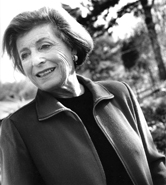 Twenty years ago this month, the Midwest Center for Holocaust Education conducted the first interview for its Witnesses to the Holocaust project. Organized in cooperation with the Fortunoff Archive for Video Testimonies at Yale University and funded by grants from the William T. Kemper Foundation, David Woods Kemper Memorial Foundation and Oppenstein Brothers Foundation, the project resulted in the recording of 48 oral testimonies and two documentaries, produced by what was then Video Post Productions (now Outpost Worldwide).
Twenty years ago this month, the Midwest Center for Holocaust Education conducted the first interview for its Witnesses to the Holocaust project. Organized in cooperation with the Fortunoff Archive for Video Testimonies at Yale University and funded by grants from the William T. Kemper Foundation, David Woods Kemper Memorial Foundation and Oppenstein Brothers Foundation, the project resulted in the recording of 48 oral testimonies and two documentaries, produced by what was then Video Post Productions (now Outpost Worldwide).
Two decades later and aided by technological advances few could have imagined, MCHE is making its treasure trove of survivor testimonies available online. Jessica Rockhold, MCHE’s director of school programs and teacher education, is enhancing each narrative with additional resources specific to that individual’s experience.
Testimonies include those originally filmed on video for Witnesses to the Holocaust as well as those recorded on audio for Portrait 2000, a photographic exhibit of local survivors, funded by the Jewish Community Foundation, which led to publication of “From the Heart” by Kansas City Star Books in 2001. Photographers Gloria Baker Feinstein and David Sosland contributed their time and talent to that project, and Trudi Galblum crafted the accompanying profiles.
“This new online project represents the culmination of 20 years of dedicated efforts to collect, edit and reformat interviews by Kansas City-area survivors,” observed MCHE’s Executive Director Jean Zeldin, who served as project director for Witnesses to the Holocaust. “Being part of this process has been a true honor and privilege, and we are extremely grateful to all those who shared their stories with us and to those who volunteered as interviewers and transcribers. Through their participation, MCHE has realized its vision of preserving the legacy of our community’s survivors and teaching about this history by illustrating its impact on one person, one family.”
As the original VHS interview format became outdated, generous financial support from the Claims Conference, Jewish Federation and the Jewish Community Foundation, along with special consideration from Outpost Worldwide, provided MCHE with the means to digitize its collection of videotaped interviews and condense the original interviews for classroom use, Web postings, and for free loan through MCHE’s resource center. The full-length narratives, which run from 45 minutes to three hours in length, may be viewed on site at MCHE.
In addition, through the efforts and expertise of Dr. Fran Sternberg, MCHE’s former director of university programs and adult education, six thematic DVDs were produced and are available for sale. MCHE’s next goal is to raise the funds necessary to transfer approximately 35 audio interviews from cassettes to digital and MP3 files and to add closed captioning to the six thematic programs.
MCHE recently announced the launch of its “Survivor Pages” on Facebook, inviting MCHE’s “friends” to view the profile of Clara Grossman, a Hungarian survivor of Auschwitz who was the first interview of 2014. The next set of profiles, featuring five additional Auschwitz survivors, is scheduled to post on Jan. 27, coinciding with the 69th anniversary of the liberation of Auschwitz and the date designated by the United Nations in 2005 as International Holocaust Remembrance Day. Additional pages will be introduced each month and will be announced through Facebook and through e-blasts to MCHE members.
To view survivor pages as they become available, visit www.mchekc.org or “like” MCHE on Facebook to receive automatic updates as new profiles are posted: https://www.facebook.com/MidwestCenterforHolocaustEducation.



